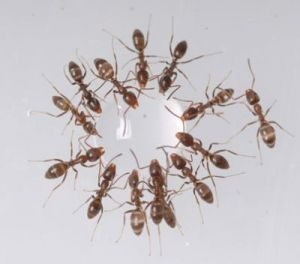GOAL
An intelligent agent, running on the personal computing platform of the user, needs to be equipped with a suite of interaction technologies suitable for an cooperative society of these agents. Prof. Jeff Rosenschein (HUJI) will lead a team to explore the architecture of cooperation that supports social network of intelligent agents. The natural mobility of the intelligent agent requires the dynamic formation of social groupings with other intelligent agents, and appropriate exploitation of cooperative sensor agents.
Some of the specific technologies to be supported by this interaction architecture for computational social networks include:
-
Learning applied to multi-agent negotiation strategies
-
Multi-agent planning
-
Learning applied to Dynamic coalition formation
-
Preference aggregation
-
Emulating “non-rational” aspects of human behavior

Machine learning will be used to improve agent interaction at two levels:
-
Individual agent engaged in self-motivated interaction with other agents
-
Groups of agents involved in cooperative joint activity.
During the first year, the research will focus on reaching decisions in multi-agent systems, in particular in ad-hoc proximity networks involving surrogate agents running on personal smartphones. The primary areas of focus during that first year will be research into multi-agent automated negotiation (areas 1 and 2 in the above list), and research on preference aggregation (area 4). These areas constitute foundational technologies that will be used in a “social behavior module”, and provide the tools for additional, higher-level coordination techniques.
In the second stage of the project, the focus will be on coalition formation among cooperating agents, and their improvement of cooperation via learning (areas 3 and 4); the newly developed tools will be integrated into the architecture of the first-stage module, enhancing its capabilities. The third stage of the project will be dedicated to multi-agent planning technologies (area 2), the modeling of human behavior and interaction strategies for use by automated agents (area 5), and the integration of all 3 stages’ results into a functioning agent capable of flexible interaction, using this collection of approaches.
The expected output by the end of the first year includes:
-
A characterization of separate components of the social behavior module, focusing on negotiation and preference aggregation
-
A definition of the social behavior module’s architecture, describing the ways in which this enables inter-agent capability discovery and (ultimately) coordination
-
Algorithms for negotiation and preference aggregation
-
A characterization of the role of learning within the negotiation component, which enables improvement of negotiation through repeated interaction and modeling
-
Algorithms for learning as applied to negotiation
-
A prototype of the social behavior module, representing a first rough implementation of the interaction module, to be further refined and expanded afterwards
In subsequent years we will provide definitions of the cooperative techniques and coalition formation techniques to be integrated into our agent surrogates, as well as the use of learning in the improvement of cooperation. We will also provide characterizations and algorithms showing how automated agents can operate more effectively through the modeling and emulation of human behavior, and algorithms for multi-agent planning. The expected output at the end of the third year, in addition to these algorithms, will include a more refined implementation of a surrogate agent integrating all approaches.
STATUS
The Hebrew University project participants have held several meetings with Intel partners to further define specific areas of research of interest to both teams. It has been concluded that the research project will concentrate on self-interested agents representing their owner’s goals; issues of forged identity will not be a consideration, but untrue or misleading information communicated by agents is possible and relevant; reputation and trust models are of interest, as are coalition-building capabilities; dynamic planning will be handled in a world of dynamic resource availability and distributed information.
Omer Lev, Prof. Rosenschein’s PhD student, has been connected to the project.
Continuing research in the area of multiagent systems has been carried out by Prof. Rosenschein’s lab, on the topics of auctions and computational social choice (voting). This has resulted in two Intel-supported papers having been accepted to the International Joint Conference on Autonomous Agents and Multiagent Systems (listed below), to appear in May 2013.
In addition, Prof. Rosenschein has held two 3-hour meetings at Intel Jerusalem (video-conferenced with Intel Haifa) on the subject of the field of Multiagent Systems. He has delivered a compressed version of his semester-long course on the subject to Intel participants; two additional 3-hour meetings are scheduled, to complete coverage of the topic.
PEOPLE
Prof. Jeffrey S. Rosenschein, HUJI CSE
Omer Lev, HUJI CSE
PUBLICATIONS
-
Yoad Lewenberg, Omer Lev, Yoram Bachrach, and Jeffrey S. Rosenschein. “Agent Failures in All-Pay Auctions”, The Twenty-Third International Joint Conference on Artificial Intelligence (IJCAI 2013), Beijing, August 2013. To appear.
-
Omer Lev, Maria Polukarov, Yoram Bachrach, and Jeffrey S. Rosenschein, “Mergers and Collusion in All-Pay Auctions and Crowdsourcing Contests”, The Twelfth International Joint Conference on Autonomous Agents and Multiagent Systems (AAMAS 2013), Saint Paul, Minnesota, May 2013, pages 675-682.
-
David R. M. Thompson, Omer Lev, Kevin Leyton-Brown, and Jeffrey S. Rosenschein, “Empirical Aspects of Plurality Election Equilibria”, The Twelfth International Joint Conference on Autonomous Agents and Multiagent Systems (AAMAS 2013), Saint Paul, Minnesota, May 2013, pages 391-398.
-
Yoram Bachrach, Omer Lev, Shachar Lovett, Jeffrey S. Rosenschein, and Morteza Zadimoghaddam, “Cooperative Weakest Link Games”, The Fourth Workshop on Cooperative Games in Multiagent Systems (CoopMAS 2013), St. Paul, Minnesota, May 2013, pages 96-109.
-
Yoram Bachrach, Omer Lev, Shachar Lovett, Jeffrey S. Rosenschein, and Morteza Zadimoghaddam, “Cooperative Weakest Link Games”, The Thirteenth International Joint Conference on Autonomous Agents and Multiagent Systems (AAMAS 2014), Paris, May 2014. To appear.